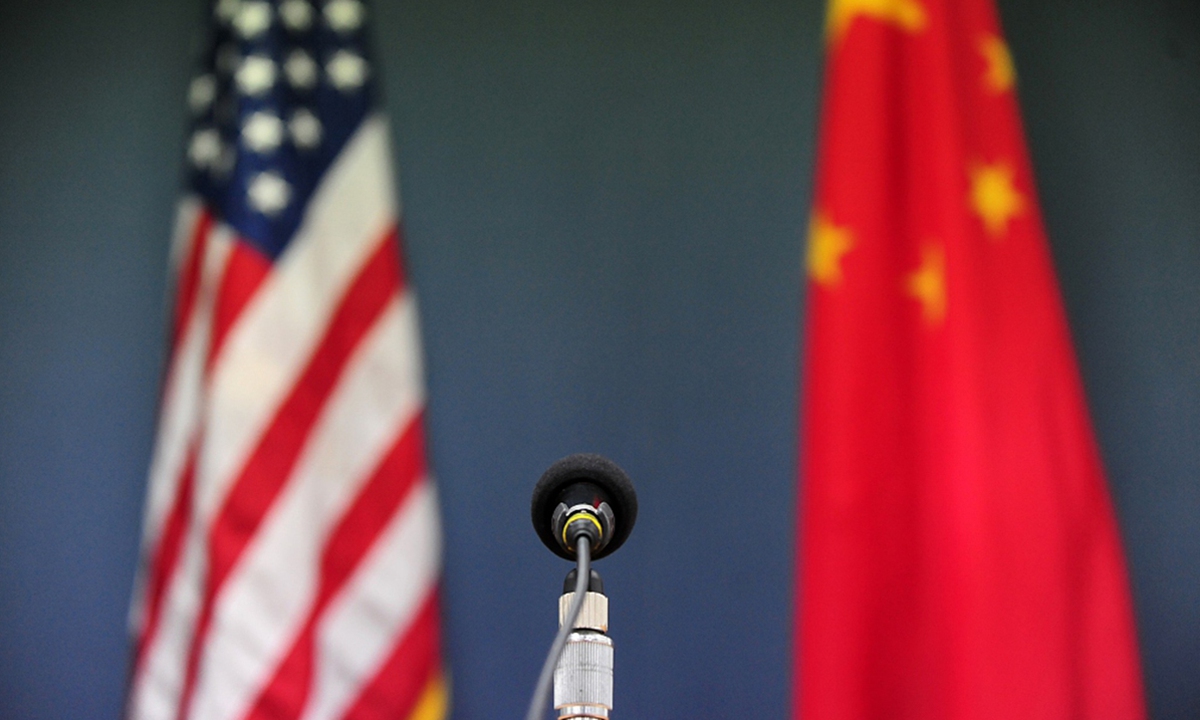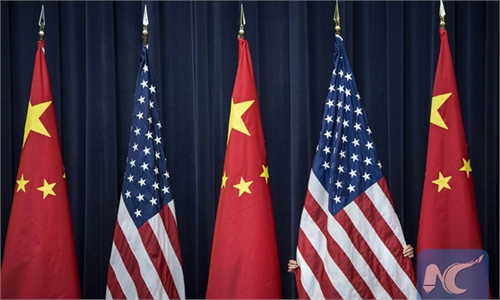Calls for China, US trade talks grow despite persistent political disputes
Removing tariffs is the priority: experts

China US Photo: VCG
After a sharp and confrontational opening as the first talks under the Biden administration between top Chinese and US diplomats concluded in Alaska on Friday local time, several experts and business representatives from China and the US at a high-profile forum on Saturday said they expected more communication and a better dialogue mechanism on bilateral trade - a sector where the world's largest two economies share massive mutual interests despite their major disputes on political and security issues.
During a session about the future of China-US economic and trade agreements at the China Development Forum 2021 on Saturday, Susan A. Thornton, senior fellow at Yale Law School's Paul Tsai China Center, said that the bilateral trade and economic relationship is the biggest area of positive and constructive cooperation.
She said although the Biden administration doesn't want to start the trade negotiations right now, a "multilateral mechanism should also be a major focus for the US and China, because this is really the over-arching global architecture that's going to fast regulate our trade and investment environment."
Yao Yang, dean of the National School of Development at Peking University, pointed out that the bilateral trade agreement would remain an important step for China and the US to improve their relationship, however painfully - both countries still have high tariffs on goods from the other.
"If the two countries really want to move forward, I think the next step is to negotiate, to get rid of those tariffs," Yao said at the session, proposing that the US and China should negotiate some new rules that are unlike the current WTO rules.
A further decoupling in bilateral trade is unaffordable. A recent report by the US Chamber of Commerce warned that if tariffs were expanded to all trade, the US GDP could see a $190 billion loss each year by 2025 and $1 trillion in the coming decade.
Noting that the average tariff on each side is 20 percent, Craig Allen, president of the US-China Business Council, warned that investment would be hit in tandem with declining trade and would be very sticky once in place.
Allen said "there are real risks that these tariffs may become permanent, and permanently distort the bilateral economic relationship. And this would be unacceptable."
"Therefore, I hope that the US and China continue implementation of the important phase one agreement and consider next steps, including a possible phase two agreement," the US business representative said.
On February 22, Chinese State Councilor and Foreign Minister Wang Yi said that economic and trade cooperation is an important part of the China-US relationship, and tariffs and other sanctioning measures should be scrapped to create the conditions for cooperation.
China has fulfilled its commitments under the phase one trade deal with the US since it took effect. According to data revealed by the Office of the US Trade Representative and the US Department of Agriculture, China has implemented at least 50 of the 57 technical commitments and had purchased over $23 billion in agricultural products, approximately 71 percent of its target under the phase one trade agreement, as of October 23, 2020.
"If the US government was pragmatic, the development of China-US economic and trade relations would not be unduly affected though there were still divergences between the two sides," Hu Qimu, chief researcher at the Sinosteel Economic Research Institute, told the Global Times in a phone interview on Sunday.
Hu added that economic and trade ties are the basis for maintaining China-US relations, but there will be no breakthroughs in the short term, and the focus of bilateral relations may shift to the political and diplomatic fields.
Reflecting on the important role of trade in China-US ties, bilateral trade grew by 8.8 percent year-on-year in 2020 and jumped 81.3 percent in the first two months of 2021, in stark contrast to the decline in bilateral diplomatic relations. The growth rate in the first two months was the highest among all regions, including the EU and ASEAN.
As China announced its 14th Five-Year Plan (2021-25) with further opening market access, analysts said that it is high time for foreign companies, including those from the US, to reap benefits from the huge and lucrative market.
"China is building a new pattern of dual-circulation development, also under the 14th Five-Year Plan (2021-25). In the bilateral economic and trade relationship, China is not only a source of intermediate inputs for many mid- and high-end industries in the US, but also an important source of consumer goods for end-users. China is also a huge market for US industrial goods and technology," said Hu.
Frederick W. Smith, chairman and CEO of FedEx Corp, said in a note sent to the Global Times that as the world continues to emerge from the challenges of the past year, a strong US-China trade relationship is more critical than ever.
He said challenges will remain, but mutually beneficial trade relations and constructive dialogue are the best ways to achieve strong, resilient supply chains between the US and China.
China and the US should continue to seek areas for cooperation that will build a solid foundation for a long-term relationship and mutual prosperity. Strengthening global health, collaborating on e-commerce, and combating climate challenges are all compelling areas of potential cooperation, he added.
He said that FedEx will continue to advocate with the new US administration for constructive and mutually beneficial trade relations between the US and China.


